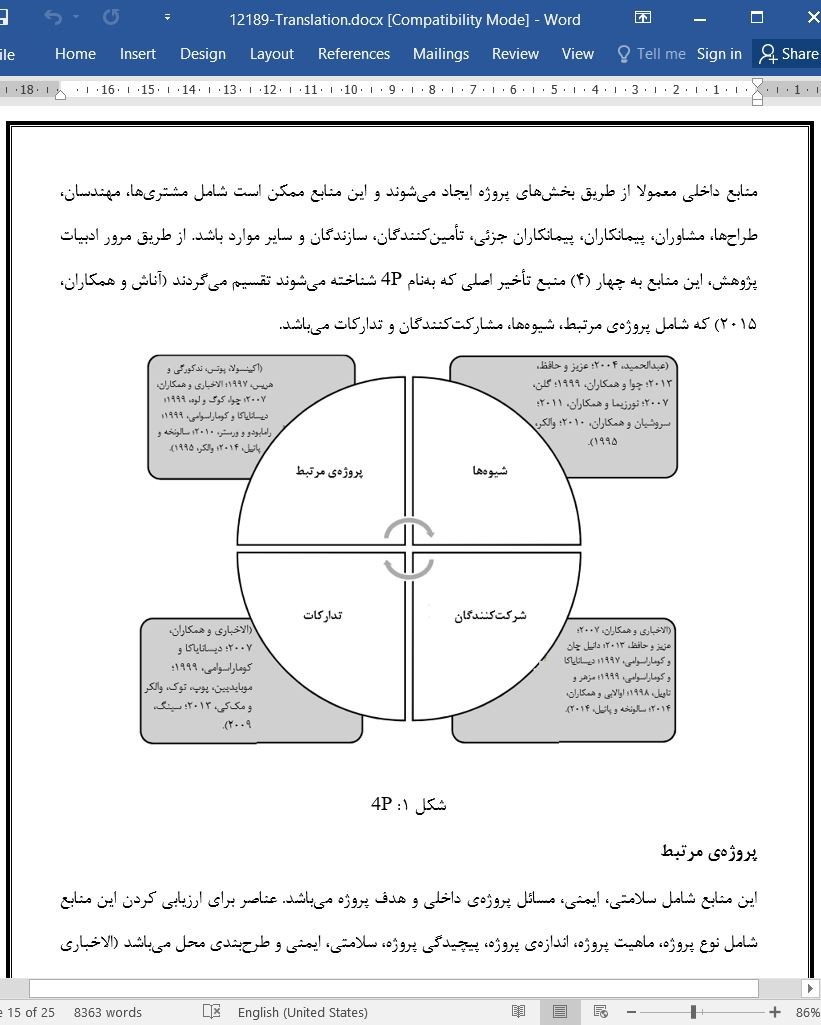
تاخیرهای 4P در مدیریت پروژه
چکیده
هدف- در نتیجهی افزایش یافتن چالشهای سرریز زمان، چندین شرکت بهصورت منظم، فرآیندهای ارزیابی تأخیر را برای بهبود عملکرد و افزایش دادن سود ایجاد نمودهاند. در صنعت ساختمان، پروژهها بسیار پیچیده هستند و شامل بودجههای قابلتوجهی نیز میباشند و بنابراین، بهینهسازی عملکرد پروژه از پایه، باعث ایجاد تحلیل میشود که بایستی برای هر مدیر پروژه امری ضروری تلقی شود. بهطور معمول مسائل تأخیرها در پروژهها بهصورت کلی مورد بحث قرار میگیرند و بهصورت جداگانه مشکلات آنها برطرف میگردد، با این وجود، یک چارچوب جامع برای تحلیل اصولی و گروهی تأخیرها، بهندرت ایجاد گشته است. در این مقاله، مفهوم 4P (پروژه مرتبط، شیوهها، شرکتکنندگان و تدارکات) برای شناسایی، تحلیل و طبقهبندی تأخیرها در محیط داخلی فرآیند توسعهی پروژه معرفی شده است.
طراحی/ روش/ دیدگاه- چارچوب مفهومی 4P از طریق تجزیهی منابع پژوهش موجود مورد تأیید قرار گرفته است.
یافتهها- جالب اینجاست که علیرغم افزایش نگرانیها در مورد تأخیرها در صنعت ساختمان، بیشتر تحقیق بر روی تأخیرها بهصورت پروژهای بوده و یا در کشور خاصی انجام گرفته است، بنابراین، اجماعی در مورد منابع تأخیرها وجود ندارد. کاربرد مفهوم پیشنهادی که یک چارچوب نظری است، سبب درک کردن منابع تأخیرهای در دسترس، ریسکهای آنها و استفاده برای ارزیابی و طبقهبندی تأخیر پروژه خواهد شد.
محدودیتها یا پیامدهای تحقیق- این تحقیق، تأخیرها را براساس اشتراکگذاری ویژگیها دستهبندی مینماید و چهار منبع اصلی را شناسایی و تحلیل میکند. ممکن است منابع یا فاکتورهای دیگری نیز وجود داشته باشد که هنوز هم وابسته یا جنبهای از 4P باشند.
پیامدهای عملی- تیمهای پروژه جهت کاهش تأخیرها در صنعت ساختمان، اطلاعرسانی را انجام میدهند.
ابتکار/ ارزش- کاربرد ابزار ارزیابی ریسک موجب مفهومسازی تأخیرها در محیط پروژهی داخلی شده است.
نتیجهگیری
در این پژوهش، مفهوم 4P از طریق مرور منابع پژوهش برای شناسایی، طبقهبندی و تحلیل منابع تأخیر در محیط پروژهی ساختمان داخلی تأیید گردیده است. ابتدا، بررسی نشان میدهد که بخشی از منابع پژوهش که مرتبط با ارزیابی ریسکها یا تأخیرها بوده است با عدم پیوستگی و متمرکز نبودن یکپارچه در این موضوع مواجه بوده است و به یک ارزیابی اصولی، پیدا کردن و توسعه دادن یک چارچوب ارزیابی تأخیر کلی درون یک محیط پروژهی داخلی نیاز دارند که بهاندازهی کافی این موضوع بررسی نشده است. جهت تصدیق کردن مفهوم، پژوهش به شناسایی منابع تأخیر پرداخته است و سپس ریسکهای منحصربهفرد که مرتبط با منابع میباشد را شناسایی نموده است. ابتدا، داده با توجه به پروژههای متوسط به بزرگ از طریق بازبینی دقیق مجلات، کنفرانسها و پایگاه دادهی دیگر در مهندسی عمران، مدیریت ساختمان، مدیریت پروژه، مدیریت فنآوری، مدیریت معماری، محیط ایجاد شده و غیره جمعآوری شده است. جهت اطمینان پیدا کردن از مفهوم جامع، این پژوهش به بررسی منابعی که توسط نویسندگان ایجاد شده است، پرداخته است تا تعیین نماید که کدام یک از مقالات همکاری یا بازخورد مرتبط داشتهاند. در نهایت، این پژوهش، منابع تأخیر را شناسایی نموده است و سپس ریسکهای منحصربهفرد مرتبط با منابع را تشخیص داده است. سپس ریسکها یا فاکتورهای تأخیر تحت منابع اصلی براساس ویژگیهای مشترک دستهبندی شده است.
Abstract
Purpose - As a result of the increasing challenges of time overrun, several companies regularly set up delay assessment procedures for performance improvement and profit maximization. In the construction industry, projects are enormously complicated and involve significant budgets, and therefore optimizing project performance through the root cause analysis should be imperative for every project manager. Typically issues of delays in projects are generally discussed and problematized separately, yet a comprehensive framework for systematic analysis and grouping of delays is rarely contended. In this article, the 4P concept (Project Related, Practices, Participants and Procurement) has been introduced for identifying, analyzing and classifying delays in the internal environment of the project development process.
Design/Method/Approach - The 4P conceptual framework was validated through the synthesis of the existing literature.
Findings – Interestingly despite the increasing concerns about delays in the construction industry, most research on delays are project and/or country specific, thus no consensus about the sources of delays. The application of the proposed concept as a theoretical framework would provide an understanding of the available delay sources, their risks and use for project delay assessment and classification.
Research limitations/implications – This study grouped delays based on shared characteristics and four main sources were identified and analyzed. There may be other sources or factors, yet would be dependent or aspect of the 4P.
Practical Implications – Informs project teams to reduce delays in the construction industry.
Originality/value – Application of risk assessment tool to conceptualized delays in the internal project environment.
Conclusion
In this paper, the 4P concept was validated through literature review for the identification, categorization, and analysis of delay sources in the internal construction project environment. First, the review indicated that the body of literature related delays assessment lacks cohesion and integrated focus, and the need to systematically assess, locate and develop comprehensive delay assessment framework within the internal project environment is not adequately addressed. To validate the concept, the study identified the sources of the delays and then further identified the individual risks associated with the sources. First, data from medium to large projects was gathered from peer-reviewed journals, conferences, books and other databases within the civil engineering, construction management, project management, technology management, architectural management, built environment, etc. To ensure the comprehensiveness of the concept, this study examined the references made by the authors to determine if those articles have relevant contributions or impacts. Finally, the study identified the sources of the delays and then further identified the individual risks associated with the sources. The risks or delay factors were then categorized under main sources based on shared characteristics.
چکیده
مقدمه
روش یا دیدگاه تحقیق
منابع داخلی تأخیرها
انواع تأخیرها
تأخیرهای قابل جبران
تأخیرهای غیرقابل جبران یا مجاز
تأخیرهای غیرمجاز
تأخیرهای همزمان
بحث
مفهوم تأخیر 4P
پروژهی مرتبط
شیوهها
نظارتکنندگان
تدارکات
ارزیابی 4P و انواع تأخیرها
نتیجهگیری
منابع
Abstract
Introduction
Research Method/Approach
The Internal Sources of Delays
Types of Delays
Concurrent Delays
Excusable/Non-compensable Delays
Non-Excusable Delays
Concurrent Delays
Discussion
The Concept of 4P Delay
Project Related
Practices
Participants
Procurement
Assessment of 4P and Types of Delays
Conclusion
References
- اصل مقاله انگلیسی با فرمت ورد (word) با قابلیت ویرایش
- ترجمه فارسی مقاله با فرمت ورد (word) با قابلیت ویرایش، بدون آرم سایت ای ترجمه
- ترجمه فارسی مقاله با فرمت pdf، بدون آرم سایت ای ترجمه



